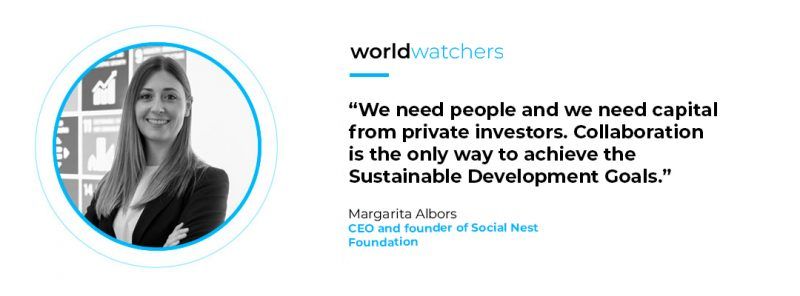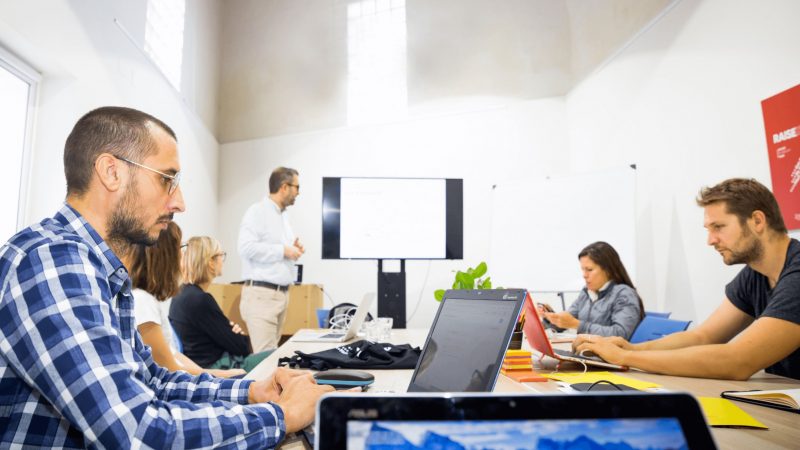They say that every revolution starts within. A non-conformist personal attitude or a small gesture against the current may seem insignificant on an individual level. And yet it takes on an unexpected force when it moves onto the collective stage.
The crisis caused by COVID-19, the Black Lives Matter movement or the fight for equal opportunities remind us that our system of production and consumption is still unfair. And that chronic injustice does not only weaken us as a society but it ultimately also makes the system itself more vulnerable. For this reason, the so-called impact investment initiatives make more and more sense. Initiatives that seek to rebuild the economic system from a social and environmental perspective, with no other purpose than to guarantee its own survival.

That the Sustainable Development Goals are not just a statement of intent but a recipe for real and profitable growth, is something we have learned from Margarita Albors. She participated in our cycle on sustainable development World Watchers and from her we learned, above all, the importance of having social entrepreneurs and impact investors. We learned, on the one hand, about attitudes of change and on the other hand, about her connection with a single objective: that the desire for change attains the collective stage.
Impact investment, an opportunity for sustainable growth
According to the organization Global Impact Investing Network, impact investing attracted more than $ 228 billion in 2017, twice as much as the previous year. This is a growing trend which Spain has joined somewhat late, but which is gaining prominence in our economic agenda largely thanks to the drive from private equity firms.
But what exactly is impact investing? These are investments that seek to generate a positive impact, both at an environmental and social level, guaranteeing their financial return. Or, in other words, a movement that seeks to promote business projects that provide solutions to the challenges we face as a society, and that simultaneously promote sustainable and profitable socio-economic development.
For years, several countries have been allocating more and more resources to creating more resilient economies. Already in 2015, the Global Steering Group for Impact Investment (GSG) was founded. It is an independent group that Spain joined in 2019, which brings together leaders from 33 countries in different fields: economy, finance, public institutions, businesses and even philanthropy.
ACCORDING TO THE UN, AN ADDITIONAL 2.5 BILLION DOLLAR INVESTMENT WOULD BE NECESSARY WORLDWIDE TO MEET THE SUSTAINABLE DEVELOPMENT GOALS
As a matter of fact, public-private collaboration is essential to promote social entrepreneurship. On the one hand, innovative ideas are always going to require funding and funds to become a reality. However, on the other hand, there are also investors willing to generate an impact on society, beyond generating a (necessary) financial return. Facilitating the meeting between both agents and generating a culture of innovation around sustainable development is very important. But these facilitating agencies are not yet abundant in our economic fabric.
In Spain, the Social Nest Foundation is one of those organizations that are making impact projects a reality.
Social Nest Foundation: a pioneering social entrepreneurship network
Ten years ago, Margarita Albors promoted the Social Nest initiative, a pioneering foundation in Spain in the field of social entrepreneurship. It was in a complex context, derived from the 2008 crisis, of great economic difficulties, which revealed the need for a change in the production model. At that time, her vision prompted her to create a hub of entrepreneurship where impact projects and startups are united with the capital and resources necessary for their development. This way, she managed to create a global platform to inspire, connect and also educate different social agents in sustainable development.

It is in this spirit that, since 2010, Social Nest Foundation has been supporting people and organizations to promote, through technology, innovative projects with environmental and social impact. From its headquarters in Valencia, the foundation has woven a privileged network that connects entrepreneurial initiatives with Spanish and international impact investors and funds.
Today, the Social Nest Foundation leads innovative programs, events and training activities which disseminate and promote the entrepreneurial spirit. A catalytic work that is based on a collaborative scheme between companies, universities and public administrations to make entrepreneurship, technology, innovation and investment the key elements of social change.
Examples of business projects with impact investment
These collaborative networks have allowed them to launch and guide projects that offer products and services from an impact approach in different sectors. The examples are countless, such as the responsible fashion brand Uttopy, which supports environmental and social sustainability through its products and accessories with a message.
Bounsel is another impact entrepreneurship project within the legal tech, in which technology is applied to the legal field. A multi-objective initiative that seeks not only to improve administrative procedures in the legal field through technology but also to promote equality policies in the workplace and improve the culture of the general population in legal concepts.
Or the initiative Onerz, an app that calculates the carbon footprint linked to our daily activity and provides us with simple solutions to reduce it.
But perhaps one of the most successful models is Zubi Labs, a venture builder for the generation of social enterprises created by Iker Marcaide. Currently, it has twelve startups that are generating a positive impact through different sustainable business models. The project was born from the need to build a school that would follow the Montessori method. This was followed by the creation of a sustainable neighborhood co-designed by its own inhabitants, which is now evolving towards a circular waste management model. An exciting project in its conceptualization that evolves day by day with new models that enrich it.
Intrapreneurship, an attitude of impact
And yet the solution does not always lie in starting businesses. Or maybe yes, but in another way. The drive for change is possible within each one of us, regardless of our professional activity.
In fact, companies are increasingly looking for people who contribute ideas for change and who establish new horizons within the same organization. It is becoming more and more important to generate work teams made up of people with different profiles and experiences who are capable of providing innovative solutions. It is that intrapreneurship, that attitude of wanting to transform things from within, what companies increasingly demand. People who promote equality policies, push organizations towards non-financial objectives, and design new forms of responsible consumption.
It is the importance of the environment, talent and mutual collaboration. Of trusting the projects of those people who decide to take the initiative, but also of taking advantage of the opportunities that the system offers. We need people, we need institutions like the Social Nest Foundation, and we need capital from private investors.
Yes, change is possible and it is within each one of us. We just have to take a step forward.











